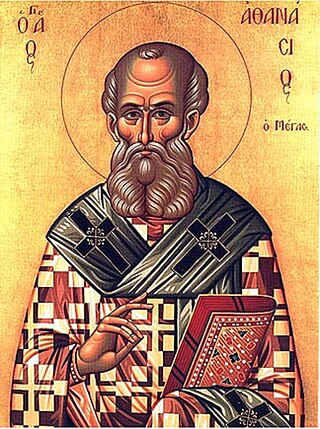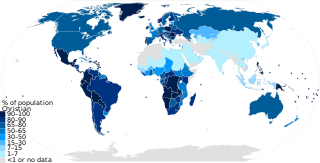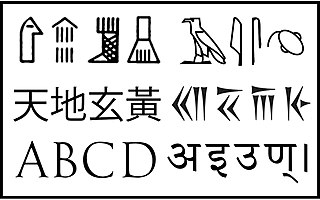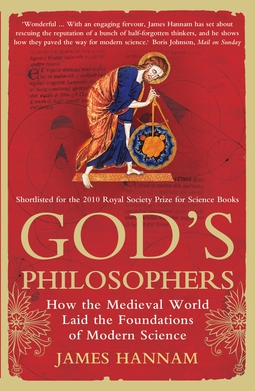
Athanasius I of Alexandria, also called Athanasius the Great, Athanasius the Confessor, or, among Coptic Christians, Athanasius the Apostolic, was a church father and the 20th pope of Alexandria. His intermittent episcopacy spanned 45 years, of which over 17 encompassed five exiles, when he was replaced on the order of four different Roman emperors. Athanasius was a Christian theologian, a Church Father, the chief defender of Trinitarianism against Arianism, and a noted Egyptian Christian leader of the fourth century.

Christendom historically refers to the Christian states, Christian empires, Christian-majority countries and the countries in which Christianity dominates, prevails, or that it is culturally or historically intertwined with.

Polybius was a Greek historian of the middle Hellenistic period. He is noted for his work The Histories, a universal history documenting the rise of Rome in the Mediterranean in the third and second centuries BC. It covered the period of 264–146 BC, recording in detail events in Italy, Iberia, Greece, Macedonia, Syria, Egypt and Africa, and documented the Punic Wars and Macedonian Wars among many others.

The History of the Decline and Fall of the Roman Empire is a six-volume work by the English historian Edward Gibbon. It traces Western civilization from the height of the Roman Empire to the fall of Byzantium in the fifteenth century. Volume I was published in 1776 and went through six printings. Volumes II and III were published in 1781; volumes IV, V, and VI in 1788–1789.

Classical antiquity, also known as the classical era, classical period, classical age, or simply antiquity, is the period of cultural history between the 8th century BC and the 8th century AD centered on the Mediterranean Sea, comprising the interlocking civilizations of ancient Greece and ancient Rome known as the Greco-Roman world. It is the period in which both Greek and Roman societies flourished and wielded huge influence throughout much of Europe, North Africa, and West Asia.

Peter Robert Lamont Brown is an Irish historian. He is the Rollins Professor of History Emeritus at Princeton University. Brown is credited with having brought coherence to the field of Late Antiquity, and is often regarded as the inventor of said field. His work has concerned, in particular, the religious culture of the later Roman Empire and early medieval Europe, and the relation between religion and society.

Colonies in antiquity were post-Iron Age city-states founded from a mother-city, not from a territory-at-large. Bonds between a colony and its metropolis remained often close, and took specific forms during the period of classical antiquity. Generally, colonies founded by the ancient Phoenicians, Carthage, Rome, Alexander the Great and his successors remained tied to their metropolis, but Greek colonies of the Archaic and Classical eras were sovereign and self-governing from their inception. While Greek colonies were often founded to solve social unrest in the mother-city, by expelling a part of the population, Hellenistic, Roman, Carthaginian, and Han Chinese colonies were used for trade, expansion and empire-building.
Archaeology is the study of human activity in the past, primarily through the recovery and analysis of the material culture and environmental data that they have left behind, which includes artifacts, architecture, biofacts and cultural landscapes.

Michael Grant was an English classicist, numismatist, and author of numerous books on ancient history. His 1956 translation of Tacitus's Annals of Imperial Rome remains a standard of the work. Having studied and held a number of academic posts in the United Kingdom and the Middle East, he retired early to devote himself fully to writing. He once described himself as "one of the very few freelancers in the field of ancient history: a rare phenomenon". As a populariser, his hallmarks were his prolific output and his unwillingness to oversimplify or talk down to his readership. He published over 70 works.
Richard John Alexander Talbert is a British-American contemporary ancient historian and classicist on the faculty of the University of North Carolina at Chapel Hill, where he is William Rand Kenan, Jr., Professor of Ancient History and Classics. Talbert is a leading scholar of ancient geography and the idea of space in the ancient Mediterranean world.

The history of writing traces the development of expressing language by systems of markings and how these markings were used for various purposes in different societies, thereby transforming social organization. Writing systems are the foundation of literacy and literacy learning, with all the social and psychological consequences associated with literacy activities.
Roman historiography stretches back to at least the 3rd century BC and was indebted to earlier Greek historiography. The Romans relied on previous models in the Greek tradition such as the works of Herodotus and Thucydides. Roman historiographical forms are usually different from their Greek counterparts, however, and often emphasize Roman concerns. The Roman style of history was based on the way that the Annals of the Pontifex Maximus, or the Annales Maximi, were recorded. The Annales Maximi include a wide array of information, including religious documents, names of consuls, deaths of priests, and various disasters throughout history. Also part of the Annales Maximi are the White Tablets, or the "Tabulae Albatae", which consist of information on the origin of the Roman Republic.
This timeline of ancient history lists historical events of the documented ancient past from the beginning of recorded history until the Early Middle Ages. Prior to this time period, prehistory civilizations were pre-literate and did not have written language.

The Western world, also known as the West, primarily refers to various nations and states in the regions of Australasia, Europe, and the Americas. The Western world likewise is called the Occident in contrast to the Eastern world known as the Orient. The West is considered an evolving concept; made up of cultural, political, and economic synergy among diverse groups of people, and not a rigid region with fixed borders and members. Definitions for "Western world" vary according to context and perspectives.

Comparative studies of the Roman and Han empires is a historical comparative research involving the roughly contemporaneous Roman Empire and the Han dynasty of early imperial China. At their peaks, both states controlled up to a half of the world population and produced political and cultural legacies that endure to the modern era; comparative studies largely focus on their similar scale at their pinnacles and on synchronism in their rise and decline. The Han and Roman empires declined roughly within the same time frame during the third and fifth centuries A.D, respectively with the onset of the Three Kingdoms Period and the collapse of the Western Roman Empire. However, the Chinese empire came together again under the Sui and Tang dynasties while the Eastern administrative half of the Roman Empire survived the fall of the Western half and continued well into the 15th century AD.

Medieval philosophy is the philosophy that existed through the Middle Ages, the period roughly extending from the fall of the Western Roman Empire in the 5th century until after the Renaissance in the 13th and 14th centuries. Medieval philosophy, understood as a project of independent philosophical inquiry, began in Baghdad, in the middle of the 8th century, and in France, in the itinerant court of Charlemagne, in the last quarter of the 8th century. It is defined partly by the process of rediscovering the ancient culture developed in Greece and Rome during the Classical period, and partly by the need to address theological problems and to integrate sacred doctrine with secular learning.

God's Philosophers: How the Medieval World Laid the Foundations of Modern Science is a 2009 book written by British historian of science James Hannam.

Walter Scheidel is an Austrian historian who teaches ancient history at Stanford University, California. Scheidel's main research interests are ancient social and economic history, pre-modern historical demography, and comparative and transdisciplinary approaches to world history.

The Closing of the Western Mind: The Rise of Faith and the Fall of Reason (2003) is a book by the classical historian Charles Freeman, in which he discusses the relationship between the Greek philosophical tradition and Christianity, primarily in the fourth to sixth century AD. He argues that far from suppressing Greek philosophy, Christianity integrated the more authoritarian aspects of Platonism at the expense of the Aristotelian tradition. He explores the contribution of the Roman emperors to the definition of Christian doctrine, an argument followed up in his 2009 book AD 381. He dates "the reopening of the western mind" to the integration of Aristotle's thought into Christian doctrine by Thomas Aquinas in the thirteenth century.

Western civilization describes the development of human civilization beginning in Ancient Greece, and generally spreading westwards. However, Western civilization in its more strictly defined sphere traces its roots back to Rome and the Western Mediterranean. It can be strongly associated with nations linked to the former Western Roman Empire and with Medieval Western Christendom.















